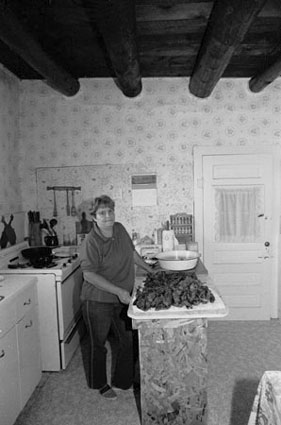Beverly Armijo
Taos, NM
Se nos enseñaba a trabajar desde pequeños. Porque los hombres, si eran pastores, tenían que estar ausentes todo el tiempo. Eran a las mujeres a quienes les tocaba encargarse del rancho. Eran las mujeres quienes se encargaban de criar a los niños. Te puedo mostrar las cercas que levantó mi abuela, que aún están en pie. Si algo creo, es que las mujeres trabajaban más duro que los hombres, porque estos todavía eran atendidos. Ellos llegan a la casa, se sientan y descansan, esperando a ser servidos como príncipes.
Mi abuela tenía tres cocinas. Tenía la cocina de verano, en donde se pasaba el tiempo, desde que los ruiseñores emigraban al norte. En cuanto veía el primer ruiseñor, decía: "Las perchas están aquí, ya es tiempo de mudar mi cocina." Ella tenía una cocina de invierno, la cual era parte de otra casa, y también tenía la cocina del enfrascado, donde preparaba todas las conservas.
You were taught to work very young. Because the men, if they were sheep herders, they had to be gone all the time. It was up to the woman to run the farm. It was up to the woman to raise the children. I can show you the fences my grandmother put up; they are still standing. If anything, I believe that the women worked harder than the men because he was still catered to. He still came home, sat back, and got waited (on) hand and foot.
My grandmother had three kitchens. She had the summer kitchen where she (would) spend the (time) from when the robins would migrate north. She'd see the first robin and she'd say "The perchas are here, it's time to move my kitchen." She had a winter kitchen, which was part of another house, and she also had the canning kitchen where they did all the canning.
